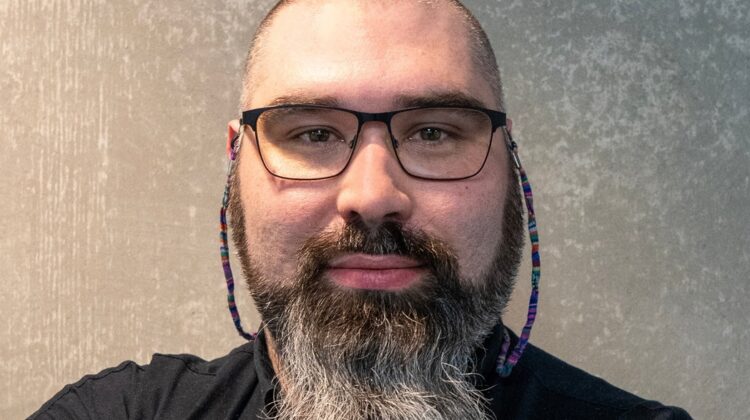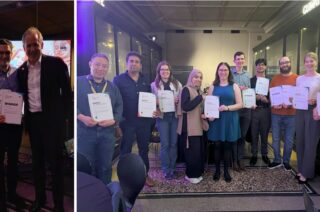Meet Teaching Excellence award winner Tom Rodgers

Tom Rodgers is a Reader in Chemical Engineering Education in the Department of Chemical Engineering. At the 2024 Teaching Excellence Awards he won the award for Educational Leadership and Flexible Learning and Digital Delivery. Here Tom tells us how he has focused on developing rich-media resources to allow students to learn at their own pace, developing strategies for group problem solving, peer marking, and in-class discussions.
Enabling students to undertake active and personalised learning with structured support
Over the past couple of years, I have been developing a resource of interactive graphical teaching elements for Chemical Engineering. It is essentially a series of mini apps on a webpage, featuring graphs with interactive elements linked to questions and course materials. I wanted to reintroduce interactive elements into learning design, especially as much of the initial learning is now asynchronous. In Chemical Engineering, there are certain design methods, especially graphical ones, that help students grasp the design process. Traditionally, we would do this with pen and paper, but with the shift to blended learning and more online delivery, students were studying on their own timelines. The resources are designed for independent use by students. They can use them to prepare for sessions or to deepen their understanding at their own pace. These are currently used by other universities and advertised in The Chemical Engineer, the professional magazine of the IChemE. It is also important to then build structured support for students back into synchronous sessions and assessments especially with group work.
“I learned that it doesn’t matter if I’m doing something for the first time, I can always take small steps and get it done! I didn’t know anything about wastewater plants, now I know a lot! And I’m always thankful, and glad to have such a kind, understanding teacher.”
MSc student
Aligning the resources with the future of Chemical Engineering
A couple of years ago, our professional body introduced new Intended Learning Outcomes, which provided the perfect opportunity to consider the future of Chemical Engineering education. While our modules align well with the Institute of Chemical Engineers (IChemE), we wanted to introduce themes that would prepare students for the future of chemical engineering; Digital Engineering, Social Responsibility, Industrial Values, and Industrial Spotlights. These groups are a bottom-up approach with all staff in the Department able to input ideas; and these are still running providing continuous improvements. Across all year groups, we looked at embedding professional skills. For example, instead of traditional oil and gas scenarios, we might use bioengineering or bioplastics cases that challenge students in the same way but also broaden their view of the field.
Developing a blended learning strategy
Like everyone else, we quickly transitioned to online learning during the pandemic. Which required large amounts of additional support for students, coordinated by myself as the Discipline Head of Education.
“I fully understand that this is a challenging time for you as well, and I want you to know that your work this semester has been really admirable and highly appreciated by a lot of students.”
Student representative
Discussions centred on making the most of this transition rather than just adjusting temporarily. We decided on a blended learning approach, which research shows is generally more effective than traditional lectures. Since not everyone in the Department was familiar with this approach, I led the development of a bank of resources to help staff adapt and create useful material for students. This was coupled with producing a new assessment strategy to provide less dependency on examinations and more focus on deep learning.
Feedback from students
To further develop the departmental practice, I worked with a student (Student Partnerships Programme) to gather insights from other students about their expectations for both online and in-person learning. This included what they found useful, how they learned, and how they interacted with Blackboard. He also spoke with staff to understand any challenges they faced in preparing materials, and from this, we developed resources to make blended learning more user-friendly. Some of the initial difficulties experienced by students was due to having to adapt midway through their studies. The blended learning approach does put pressure on live sessions to deliver something valuable beyond the resources provided online. Having our students validate our approach was extremely valuable and seeing them respond well to certain methods used in different contexts was reassuring. It is helpful to know what resonates with them directly.
“The material was nicely distributed, and I never had a feeling of being overwhelmed. There is a large selection of problems available so that makes practice and improvement way easier.”
CHEN10031 students
“The group problem questions help me interact with my peers, GTAs and the lecturer which help me feel
part of the learning community.”
Sharing best practice across the sector
Sharing with and learning from others is one of the most important things we can do, therefore it is important to share practice across the sector. For example, I have hosted international workshops on developments in practical teaching. I was asked by the IChemE to run workshops to share best practice on transition to practical work under COVID while meeting accreditation guidelines. These workshops involved over 130 delegates from over 18 counties taken from the approximately 60 IChemE accredited universities in the world. Also, I am also part of the UK network for GTA Developers and last year, hosted around 40 universities here in Manchester for the annual meeting, where we shared best practice and discussed how we can improve training across the UK.


